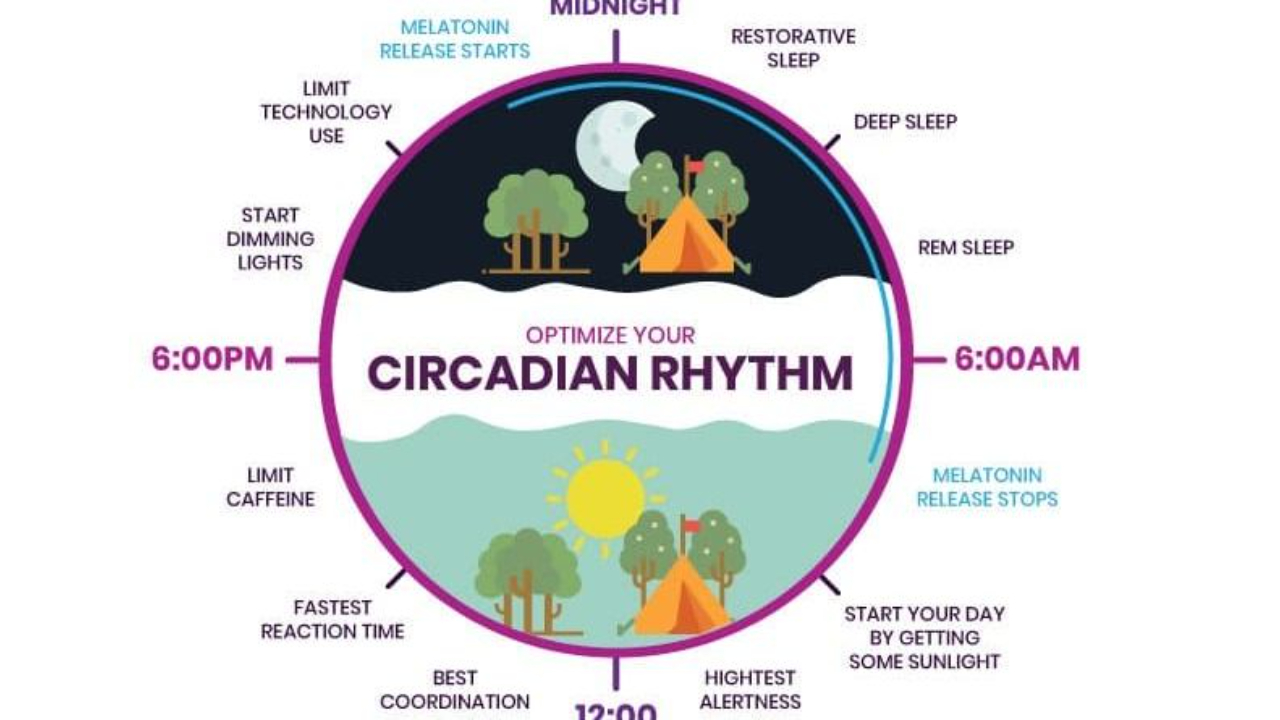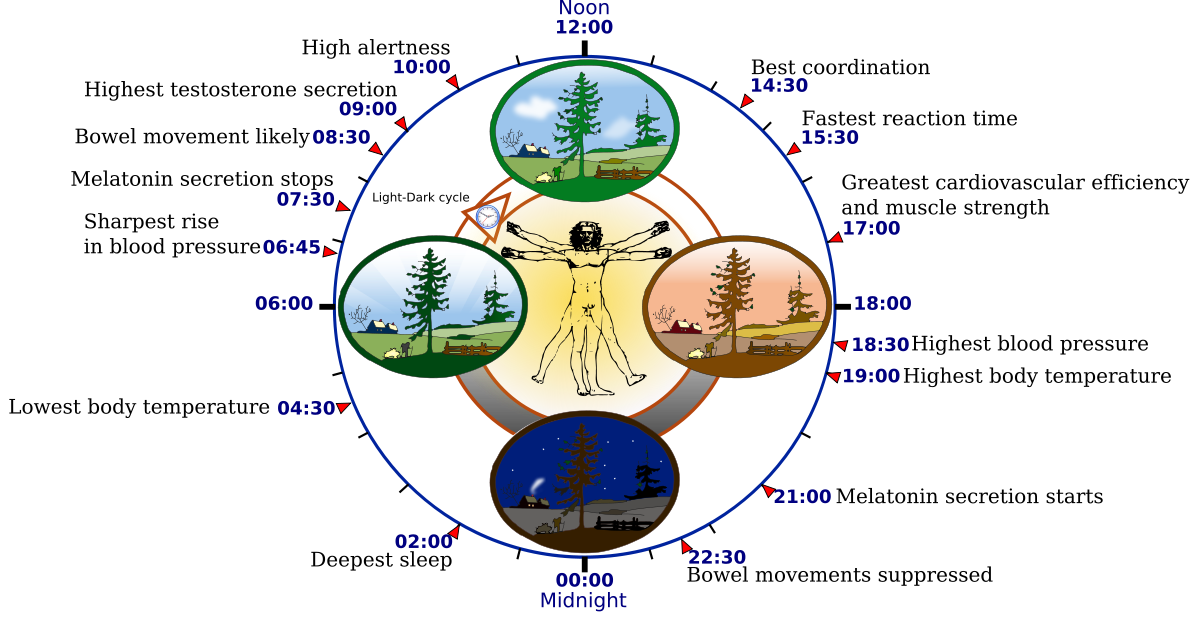The Beginners Guide To Getting In Tune With Your Circadian Rhythms
Mar 09, 2023
We have made clocks that are perfectly in sync with the industrial machinery and the Information Age and perfectly out of sync with nature and our circadian rhythm.” ― Khang Kijarro Nguyen
Do you ever feel a bit off with your body?
Maybe you’re eating healthy but can’t seem to shake the weight? Maybe your body is in constant hunger mode craving the foods that you shouldn’t be eating?
Do you have trouble focusing for long periods of time?
Can’t seem to control your mood at times?
Or perhaps you’re battling periods of low energy throughout the day and can’t seem to find the juice to play with your kids by end of day?
If you said, “Yes” to any one of those it may be time to start taking your Circadian Rhythms seriously.
It all started with Mimosa’s.
The year is 1729 and the location is Paris, France.
French Physicist Jacques d’Ortous de Mairan (JDM for short) was studying a peculiar organism. This organism was called a Mimosa. A Mimosa Pudica to be exact.
But the Mimosa Pudica was not just any plant.
It’s often grown for its unique value: the leaves fold inward and go into fetal position when touched or shaken, defending themselves from harm.

Feeling threatened is not the only time it would do this unique process.
During daylight hours the shrub would open up its leaves and at nighttime, it would close down business for the day and retract.
As interesting as this was, our boy JDM found something much more interesting about this particular plant…
Knowing the ability of the plant to shrink and contract he set about conducting a peculiar experiment:
He placed this poor little baby shrub in a box that blocked out the light.
He then let it sit for 24 hours.
He then sat and observed.

Miraculously, even though this tiny little shrub was put in a box and blocked away from the light it naturally knew when to open its leaves and when to close them.
As if they were on a schedule #clockwork
This tiny little experiment is now known as one of the first discoveries of the Circadian Rhythm (aka. Your Internal Clock.)
What is a Circadian Rhythm?
A Circadian Rhythm (aka. CR) is a biological cycle that runs for 24 hours every day.
Circadian rhythms can influence sleep-wake cycles, hormone release, eating habits and digestion, body temperature, and other important bodily functions.
They respond primarily to light, darkness, eating habits, and physical activity.
This 24 hour process is driven by your internal clock and it’s been widely researched in plants, animals, fungi, and, yes, humans.
Simply put, you, me, your dog, your cat, your mom and every other living thing on this planet has an inner clock that coordinates our daily rhythms.
This inner cycle is so important to our overall health that the 2017 Nobel Prize in Physiology or Medicine was awarded to Jeffrey C. Hall, Michael Rosbash, and Michael W. Young for “discoveries that explain how plants, animals, and humans adapt their biological rhythms so that they are synchronized with the Earth’s revolutions,” according to the Nobel Committee’s citation.
Why Should We Follow Our Circadian Rhythms?
Our bodies haven’t evolved much since the prehistoric days.
We still carry the same biological equipment we had 20,000 years ago. Through the age of humanity, our bodies have gotten used to a certain rhythm of living life.
The problem is following your rhythms in the information age is next to impossible…
Every day we’re going to bed later than we should, overeating food & drink that make us round and weak, we avoid physical activity like it’s gonna give us scabies, we’re looking at screens for 80% of our waking days until we go to sleep…
Unfortunately, all of this (and much much more) leads to lower energy, constant weight gain, and according to research eventual disease.
The Science Behind Circadian Rhythms

This is your brain. In the tiny area beyond your eye-holes is the key to all of your rhythms.
Your Circadian Rhythms are controlled by a group of nerves in the hypothalamus of the brain known as the suprachiasmatic (1) nucleus, which is also known as your master clock or SCN for short.
Your master clock is like a signaling center that responds to environmental cues like light, dark, physical activity, and eating habits.

This is a basic idea of how our rhythms work.
When certain cues are experienced your body triggers the release of hormones, regulates temperature, and influences metabolism, sleep, and mood.
Example #1 of a Circadian Rhythm — I have a habit of waking up and immediately going to number 1 or number 2. This is a process that is automated by my body. It’s a sign of a regular circadian rhythm.
Example #2 of a Circadian Rhythm— When the sun starts going down your body starts preparing for sleep by producing melatonin. More melatonin causes you to be sleepy thus preparing you for bed.
When things are in balance your body can run like clockwork much like this assembly line.
But when your master clock is thrown out of balance, your natural circadian rhythms can be disrupted leading to a domino effect of physical ailments.
Changes in sleep patterns, changes in eating patterns, traveling different time zones, working night shifts, going out too late, working out late, and other disturbances to your schedule can interrupt your Circadian Rhythm.
If you want to see a disrupted Circadian Rhythm all you gotta do is observe new moms and new dads. When a kid comes into the picture their rhythms get totally thrown off.

When a new baby comes into town parents become sleep deprived, they start eating at random times of the day and, in general, they stop taking care of themselves.
Have you ever heard of the “Freshman 15”?
Well, for a lot of pregnancies, there’s the “Love Pounds”, which is an extra 15 or so pounds of weight gain for BOTH parents when a child comes into their lives.
When a new child comes into the picture their rhythms get thrown out of whack. Sleep gets disrupted and this has a direct effect on their eating patterns.
All of this combined creates a massive disruption to life itself and their bodies respond with low energy, mood swings, weight gain, and accelerated aging.
Not Following Your Circadian Rhythm Can Lead to a Compromised Health and Body
Your rhythms are way more important than you think. Researchers are starting to find that not honing in your Circadian Rhythm can have a number of impacts on your health and body.
(2) In a large study of more than 8000 workers from 40 different organizations, researchers found that shift workers were more likely to suffer from infectious diseases, ranging from the common cold to stomach infections, than non–shift workers. These observations show us that when our rhythm is off and we come in contact with everyday bugs or viruses that we are typically resistant to, they can cause serious illness.
Bad lifestyle habits directly affect our circadian rhythms, and while they may not kill us in the strictest sense, they do make us vulnerable to factors that can kill us over time or make life increasingly unbearable.
Some things that may happen as a result of having disrupted circadian rhythms are:
- Fat gain
- Increased Hunger
- Accelerated Aging
- Changes in mood
- Neurologic disorders
- Metabolic disorders
- Insomnia
- Hormone Disruption
- Elevated Blood Pressure
- Cardiovascular disease
As bad as all this may sound your life doesn’t have to be perfect to be in tune with your rhythms. In fact, when you entrain one part of your life to a specific rhythm you may find that everything eventually falls into place.
We CAN train our circadian rhythms to work for us. We can manage our day-to-day rhythms and make them start working for us, instead of against us.
It’s just a matter of a few tweaks.
What Can You Do to Start Training Your Rhythms?
“You know what’s sexier than slowly killing yourself with drugs, alcohol, late nights, and junk food? Having a regular sleep schedule. Eating ample amounts of nutrient-dense foods. Having your finances in order.” — Jordan Gray
#1 — Fix your sleeping patterns
The most important aspect of training your rhythms starts and ends with your sleep patterns.
Help your body sync up with your master clock by keeping up regular wake and sleeping times. Keep your times within half an hour of each other (even on weekends) to allow your body to naturally prepare for sleep.
#2 — Have a habitual schedule of feasting and fasting
When it comes to eating your body loves to be on a routine as well. Get your body onto a natural schedule of eating that works for your lifestyle.
From my experience with clients, I’ve found every person to have a natural way to how they like to eat. Once they find their eating rhythms they say it makes getting lean much easier.
Of course, the better quality of food you eat the more efficient your body will work.
#3 — Get at least 3 workouts a week.
Intense physical activity, whether through cardio or weight lifting, has been known to help entrain your Circadian Rhythms because of their positive effect on sleep.
They’re starting to find that your muscles have their own circadian rhythm to when they like to be worked.
Avoid nighttime workouts at least 3 hours prior to bed when possible as they disrupt sleep patterns.
#4 — Get more sun exposure
Sunlight should be the trigger that resets your circadian clock. It is your timing cue or Zeitberger as researchers call it.
The sun entrains our physiology and getting more of it helps prevent critical illnesses.
Sunlight can, and should, be the trigger that resets the circadian clock daily; it is the timing cue, also called a zeitgeber, which entrains the physiologies of humans and thereby helps to prevent critical illness
To Summarize…
1. Our Circadian Rhythms are a 24-hour cycle that influences sleep-wake cycles, hormone release, eating habits and digestion, body temperature, and other important bodily functions.
2. They respond primarily to light, darkness, eating habits, and physical activity.
3. Not following your Circadian Rhythms can lead to seriously bad health stuff over time.
4. You can entrain your rhythms to start working for you instead of against you. Make the necessary changes to your lifestyle and start getting back in tune with your natural rhythms.
Want more awesome articles like this? Join 65k+ subscribers on our high performance newsletter.
Citations and Notes
- Pronounced SUPRA-KIYEZ-MATIC
- D. C. Mohren et al., “Prevalence of Common Infections Among Employees in Different Work Schedules,” Journal of Occupational and Environmental Medicine 44, no. 11 (2002): 1003– 11.
- Anecdotal I know but when you see things happening over and over it becomes a pattern. Having done this with so many people over the years I’ve become a staunch believer in Circadian Rhythms. This is new knowledge on age-old bio-tech that we’re just becoming privy to and if you’re still reading this far into the notes section I’m assuming you feel so as well…or you just like to hear me ramble.
